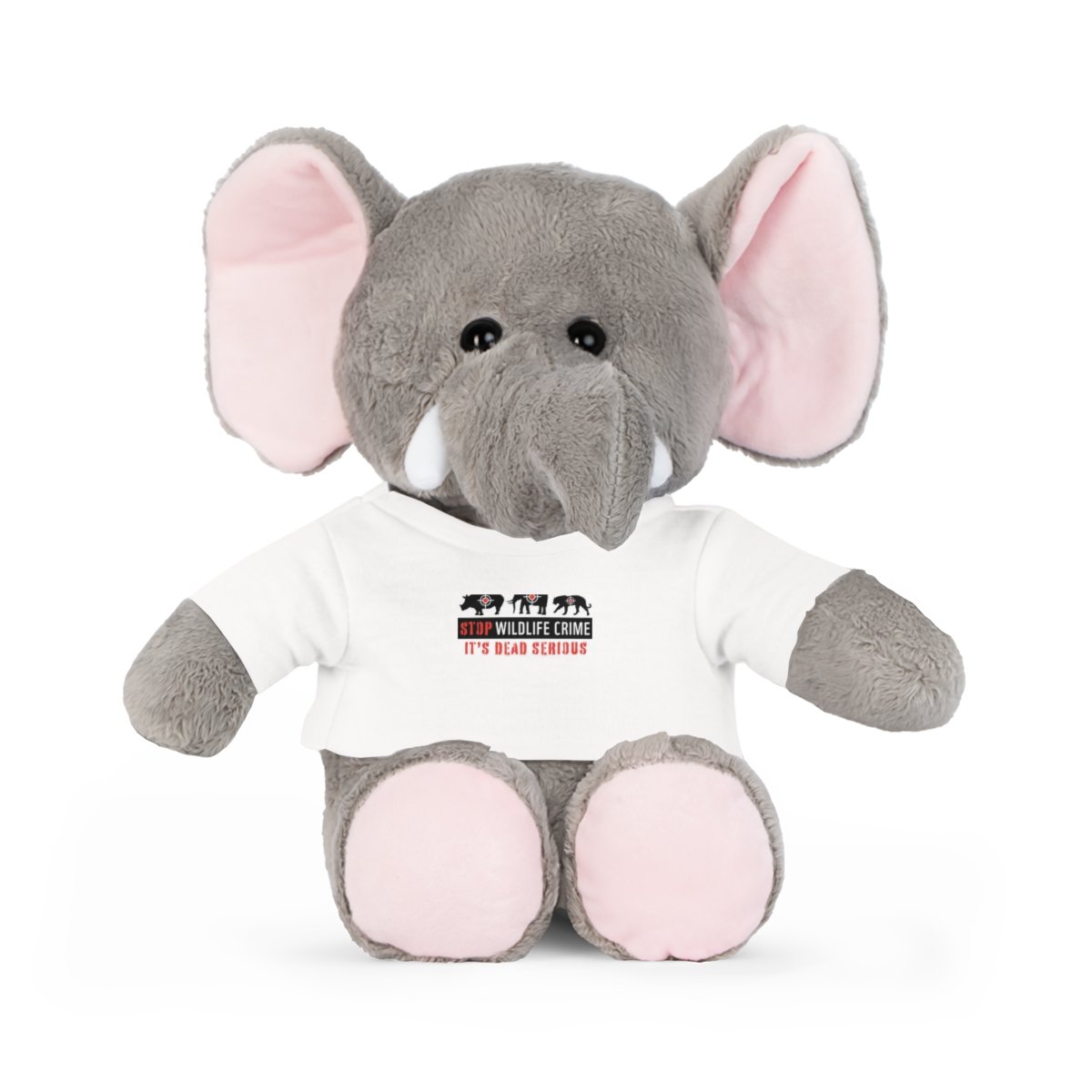This symbolic stuffed toy represents our fight against all animal and wildlife abuse and for their welfare!
100% of all profits after Cost of Goods Sold, packaging cost and shipping fee, are given direct to the World Wildlife Fund for their parts in helping stop Poaching.
Be a part of that organization that helps stop Poaching.
All profits are issued to World Wildlife Fund.
Learn more about this issue and use this a way to be a part of any successes:
Each year, at least 20,000 African elephants are illegally killed for their tusks. A decade-long resurgence in demand for elephant ivory, particularly in parts of Asia, has fueled this rampant poaching epidemic. The elephant ivory trade not only threatens the very survival of this iconic species and causes broader ecological consequences, but also endangers the lives and livelihoods of local people and undermines national and regional security.
Promisingly, a historic opportunity emerged to stop the African elephant poaching crisis: governments inititated concerted action to address this wildlife crime. The United States implemented a near-total ban on elephant ivory trade in 2016, and the United Kingdom, Singapore, Hong Kong, and other elephant ivory markets followed suit. Most significantly, China took the remarkable step of closing its legal domestic ivory market at the end of 2017. Other Asian countries with open elephant ivory trade are under substantial pressure to take action.
WWF and its partners have successfully driven international action at the highest levels that, along with diplomatic and public pressure from all sides, contributed to the game-changing China ban. Now, we are working to ensure the ban is successful by eliminating remaining consumer demand for elephant ivory and black-market sales. A proliferation of trade and demand for illegal elephant ivory outside China could seriously undermine the effectiveness of China’s ban.
WWF is addressing the root of the problem by engaging directly with elephant ivory consumers and working with other governments to ensure the imminent closure of open elephant ivory markets, as well as working to understand the underlying motivations of elephant ivory buyers to develop strategies to influence them. Our goal is to create a new social norm that buying illegal elephant ivory products is socially unacceptable.
There is an entirely separate and legal trade of walrus ivory, which is culturally and economically important to Indigenous communities in the Arctic. The sustainable use and sale of walrus ivory by Alaska Native peoples has not had the same negative impacts caused by the illegal trade of elephant ivory.
A series of recent arrests of elephant poachers and ivory traffickers in Cameroon and the Republic of Congo have raised hopes that Central African authorities are finally starting to make serious efforts to tackle wildlife crime in the hard-hit Congo Basin.
The authorities in southern Cameroon last week seized eight ivory tusks and arrested three traffickers, including a councilman, in a raid in Djoum, while a joint Cameroon and Congo enforcement team arrested one poacher in possession of six tusks and an AK47 in Nki National Park.
Two weeks ago, police in Cameroon detained another trafficker and seized three elephant tails and three elephant feet during an operation coordinated by EAGLE, a network of NGOs supporting law enforcement activities in Central, East and West Africa.
“These arrests demonstrate yet again the alarming scale of elephant poaching and ivory trafficking in the Congo Basin, but they are also an encouraging sign that the authorities are fighting back,” said Alain Ononino, WWF’s Head of Policy for the Wildlife Crime Initiative in Central Africa. “Global momentum to tackle wildlife crime has been growing for the past few years but there has been insufficient action on the ground in Central Africa until now – hopefully this crackdown is just the start.”
Along with the raids and arrests, the judicial authorities in Cameroon and Congo have also imposed appropriately heavy punishments on wildlife criminals recently – a significant change from the past when suspects could usually count on impunity for their crimes.
Last month in Congo, four elephant poachers arrested in the northern town of Sembe in December, were given similar jail terms as well as fines totaling XAF 2 million (around US$4,000) for elephant killing and the illegal possession of arms and ammunitions.
Meanwhile, back in December in eastern Cameroon, two registrars working at the High Court in Yokadouma were sent to prison for three years for stealing ivory tusks kept under seal in the court. The two culprits were caught red-handed in October 2014 while transporting the tusks to the capital Yaounde.
“These very welcome steps will not immediately stop the industrial killing of elephants and other wildlife in the Congo Basin, but they show the increasing determination of the authorities to end these crimes, by arresting not only poachers but also other wildlife criminals higher up the trafficking chain – and by ensuring they face justice,” said Marc Languy, WWF’s Director for Central Africa.
“WWF has helped the authorities to strengthen their efforts against ivory traffickers and we will continue to support them as they seek to bring elephant poaching under control,” added Languy.
In a bid to reduce ivory trafficking by minimizing the risk of confiscated ivory being stolen, WWF and TRAFFIC, the wildlife trade monitoring network, supported Cameroon’s Ministry of Forestry and Wildlife to retrieve 354 tusks and 205 pieces of ivory from law enforcement services across the country in 2015. The ivory was moved to a safe central storage place. These activities fall under the country’s National Ivory Action Plan.
According to Cameroon and Congolese wildlife laws, anyone found in possession of elephant products, including ivory, is suspected of having killed the animal. The maximum penalties for killing an elephant, which is a ‘totally protected’ species are three years in jail and/or XAF 10 million (around US$20,000) in Cameroon and five years imprisonment and/or XAF five million (around US$10,000) in the Republic of Congo.
.: 100% Polyester t-shirt
.: One-sided print
.: Sewn-in tag on left legde








Reviews
There are no reviews yet.